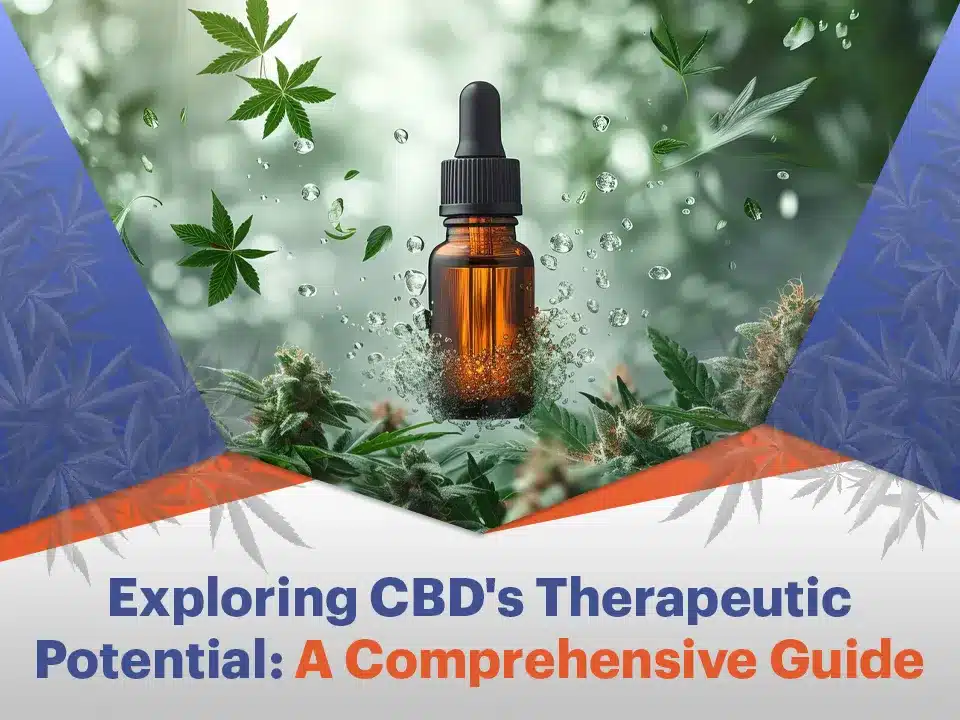
In recent years, Cannabidiol, or CBD, has captured the attention of the wellness community as a compelling natural treatment option for a broad spectrum of health issues. As modern medicine continues to explore holistic approaches to healing, CBD has emerged as a powerful alternative to traditional pharmaceuticals, attracting those seeking safer and more natural solutions to their health problems. With its low propensity for causing psychoactive effects, unlike its cousin compound, CBD offers the healing benefits of the cannabis plant without the high, making it an appealing option for individuals looking for relief from everything from chronic pain to anxiety.
This comprehensive guide aims to unpack the therapeutic potential of CBD, providing a deep dive into the myriad benefits it offers. We will explore the diverse applications of CBD, backed by scientific research and clinical studies, that showcase its role in treating various conditions, enhancing overall wellness, and contributing to a healthier life. The following sections will cover how CBD works within the body, the benefits of using CBD oil, guidelines for dosing and administration, potential side effects, and the best practices for selecting high-quality CBD products. By understanding the full scope of CBD’s capabilities, consumers can make informed decisions that align with their health and wellness goals.
What is CBD?
Cannabidiol, commonly referred to as CBD, is one of over a hundred compounds known as cannabinoids found in the cannabis plant. Unlike the most well-known cannabinoid associated with the psychoactive effects, CBD does not produce a high. This absence of psychoactivity makes CBD an attractive option for those seeking therapeutic benefits without the altered mental state often linked to cannabis.
CBD interacts with the human body’s endocannabinoid system (ECS), but it does so in a way that differs significantly from how it engages with this system. The ECS plays a crucial role in regulating a variety of physiological and cognitive processes, including pain sensation, mood, memory, and appetite, and mediates the psychoactive effects of cannabis. CBD’s unique interaction with the ECS helps modulate and balance these processes without producing the intoxicating effects.
Therapeutic Applications of CBD

CBD’s rise in popularity can be attributed to its vast potential in treating a wide array of conditions:
- Anti-inflammatory Properties: CBD has been shown to reduce inflammation systemically, which can help alleviate pain and swelling associated with conditions like arthritis and autoimmune diseases.
- Pain Relief: It is particularly noted for its ability to ease chronic pain and acute pain alike by interacting with the body’s pain receptors and reducing inflammation.
- Anxiety and Depression Management: CBD’s calming effects on the nervous system make it a compelling treatment for anxiety and depression, offering a natural alternative to pharmaceutical antidepressants.
- Antipsychotic Effects: Studies suggest that CBD may benefit individuals suffering from neurological and mental disorders, including psychosis and epilepsy, by normalizing brain rhythms without the significant side effects associated with traditional medications.
- Seizure Suppression: Its anticonvulsant properties are perhaps some of the most well-documented, with several studies supporting CBD’s ability to reduce the frequency and severity of seizures.
- Additional Benefits: Emerging research indicates that CBD may offer protective benefits against diseases such as Alzheimer’s and certain types of cancer, although more research is needed in these areas.
Safety and Efficacy
While CBD is generally well-tolerated and considered safe, it can cause adverse reactions in some people. Common side effects include nausea, fatigue, and irritability. It’s important to note that CBD can interact with several medications, so it’s essential to consult with a healthcare provider before starting use, especially for those with underlying health issues or who are taking other medications.
CBD’s non-psychoactive properties and its potential to treat a diverse range of health issues without the side effects commonly associated with pharmaceutical drugs have made it an increasingly popular option in the natural wellness space. As research continues to evolve, CBD is likely to play an even more significant role in managing both common and complex medical conditions, further embedding itself into the fabric of medicinal treatments.
The Legal Status of CBD in Australia
The legality of Cannabidiol (CBD) can be quite complex and varies dramatically depending on geographic location. Understanding these legal nuances is essential for consumers wishing to use CBD products safely and legally. The legal status of CBD is primarily dependent on its source and the local laws pertaining to cannabis and hemp:
- Hemp-derived vs. Marijuana-derived CBD: CBD can be extracted from both marijuana and hemp plants. Hemp-derived CBD, which is high in CBD but low in other cannabinoids, is legal in Australia under certain conditions, while marijuana-derived CBD is subject to stricter regulations.
- Prescription CBD: Following approval by regulatory bodies, prescription CBD is available in Australia for treating severe epilepsy. This has opened new doors for research into the therapeutic potential of CBD.
Understanding these aspects of CBD legality is not only important for staying within legal boundaries but also for ensuring that the products used are safe, regulated, and likely to provide the therapeutic benefits expected. As laws continue to evolve, staying informed is the best strategy for anyone looking to explore CBD as a therapeutic option.
Health Benefits of CBD
Cannabidiol (CBD) is celebrated for its extensive range of health benefits, offering a natural alternative to traditional medications for various physical and mental conditions. Research into CBD’s therapeutic potential has revealed its efficacy in managing inflammation, pain, anxiety, and more through its interaction with the body’s endocannabinoid system (ECS) and other biological pathways.

Chronic Pain Relief
CBD is highly regarded for its effectiveness in pain management:
- Mechanism of Action: CBD helps alleviate chronic pain by influencing endocannabinoid receptor activity, reducing inflammation—a key mechanism behind pain—and modulating neurotransmitters that signal pain.
- Conditions Treated: It’s particularly beneficial for conditions like arthritis, fibromyalgia, and migraines. The anti-inflammatory and pain-suppressing qualities of CBD can provide significant relief from these chronic conditions without the adverse effects commonly associated with pharmaceutical painkillers.
Anxiety and Depression
CBD’s potential in treating anxiety and depression has gained substantial interest:
- Reducing Anxiety: CBD has been shown to reduce symptoms of anxiety in various disorders, including generalized anxiety disorder, social anxiety disorder, and PTSD. It acts on the brain’s serotonin receptors, which regulate mood and social behaviour, akin to how selective serotonin reuptake inhibitors (SSRIs) work, but with fewer side effects.
- Alleviating Depression: Through its interaction with the endocannabinoid system, CBD can also enhance mood and alleviate depression, providing a natural treatment option that promotes overall well-being and emotional balance.
Cancer-Related Symptoms
For cancer patients, CBD offers a beacon of relief:
- Symptom Management: CBD may help mitigate cancer-related symptoms and treatment side effects, such as nausea, vomiting, and pain. This can make a significant difference in the quality of life for patients undergoing chemotherapy.
- Pain Reduction: By reducing inflammation and directly curbing pain signalling, CBD can alleviate the discomfort associated with both the disease and its treatment modalities.
Neuroprotective Properties
CBD’s benefits extend to neuroprotection, suggesting its potential in managing neurological disorders:
- Epilepsy: Among the most significant clinical successes of CBD is its effectiveness in reducing the frequency of seizures in epilepsy patients, particularly in rare forms like Dravet and Lennox-Gastaut syndromes.
- Multiple Sclerosis (MS): CBD has also been used to lessen symptoms of MS, such as muscle spasms and neurological pain, due to its anti-inflammatory and neuroprotective effects.
Heart Health
Emerging studies suggest that CBD may benefit the heart:
- Circulatory Benefits: CBD’s ability to lower high blood pressure, a major risk factor for heart attack and stroke, highlights its potential as a therapeutic agent for cardiovascular health.
- Reduced Arterial Stiffness: Regular use of CBD has been linked to reduced arterial stiffness and heart inflammation, further advocating its role in cardiovascular protection.
Broad-Spectrum Wellness
Beyond these specific conditions, CBD is used to promote a general state of wellness, including enhancing sleep quality, reducing inflammation throughout the body, and improving skin health through its antioxidant properties.
CBD’s wide-ranging effects on various health conditions make it a versatile and effective natural treatment option. As research continues to evolve, the scope of CBD’s benefits will likely expand, potentially offering new therapies for complex health issues. Whether used for chronic pain, mental health recovery, heart health, or neurological protection, CBD provides a potent, safe, and natural remedy that aligns with a holistic approach to health.
How to Use CBD
Understanding the various methods of CBD consumption and determining the correct dosage is crucial for maximizing its therapeutic benefits while minimizing potential risks. Here’s a guide on how to use CBD effectively:
Methods of Use
CBD can be ingested in several forms, each offering unique benefits and uses:
- Oils and Tinctures: These are the most common forms of CBD. They are usually applied under the tongue and can be absorbed directly into the bloodstream, providing quick results. They allow for precise dosage and are ideal for those requiring steady absorption.
- Capsules: For those who prefer a no-fuss application, capsules are perfect. They provide a consistent dose but take longer to kick in as they pass through the digestive system.
- Edibles: Including gummies and other infused foods, edibles are a discreet and tasty way to consume CBD. Like capsules, they are processed through the digestive system, which means they have a delayed onset of effects.
- Vapes: The inhalation of vaporized CBD provides the quickest effects, making it suitable for acute symptom relief. However, the long-term respiratory implications of vaping are still under research.
- Topical Creams: Applied directly to the skin, topicals are great for localized relief from pain and inflammation. They are popular among athletes and those with joint and muscle pains.
Dosage
Determining the right CBD dosage can be challenging and depends on multiple factors:
- Body Weight: Heavier individuals may require a higher dose of CBD to experience its effects.
- Condition Being Treated: More severe conditions typically require higher doses.
- CBD Concentration: Products vary in concentration, so the amount of CBD per dose should be clearly indicated to avoid confusion.
A typical starting dose of CBD can range from 20 to 40 mg per day. Increasing the dose incrementally until the desired effect is achieved is a sensible approach. Always start low and go slow.
Consultation with Health Professionals
Consulting with a healthcare provider is crucial, especially for individuals with existing health conditions or those currently on other medications. Healthcare providers can offer guidance on the suitability and dosage of CBD.
Read More: Inflow CBD Oils: Your Natural Path to Balanced Living
Potential Side Effects and Safety
While CBD is generally considered safe, it can cause adverse reactions in some people. Side effects noted in studies include:
- Common Side Effects: These include diarrhoea, changes in appetite, and fatigue. These symptoms are generally mild and temporary.
- Interaction with Other Medications: CBD may interact with various medications, including blood thinners, heart medications, and immune suppressants. Discuss your CBD plans with your doctor, particularly if you take prescription medications.
- Quality Concerns: As the CBD market is still relatively unregulated, quality can vary dramatically between products. Choosing high-quality, lab-tested CBD products is essential.
Navigating the Purchase of CBD
Check for Lab Reports
Always check for third-party lab results, which verify the product’s cannabinoid content and purity. Avoid products that do not provide these reports.
Full-Spectrum vs. Isolate vs. Broad-Spectrum
- Full-Spectrum: Contains all cannabinoids found in the cannabis plant.
- Broad-Spectrum: Contains multiple cannabinoids.
- Isolate: Contains only CBD.
Product Types
Choose a product type that suits your needs and lifestyle. Whether it be oils for quick relief, edibles for convenience, or topicals for local application, selecting the right form of CBD can enhance your experience.
Conclusion: Your Pathway to Natural Wellness with CBD
CBD offers a promising natural treatment for a variety of health conditions, characterized by its versatility and efficacy. From chronic pain and anxiety to inflammation and neurological disorders, CBD provides a comprehensive alternative to traditional treatments. By understanding how to use CBD, its methods of application, and the importance of dosing correctly, consumers in Australia can effectively harness the benefits of CBD, paving their way to natural wellness with informed, safe practices.



